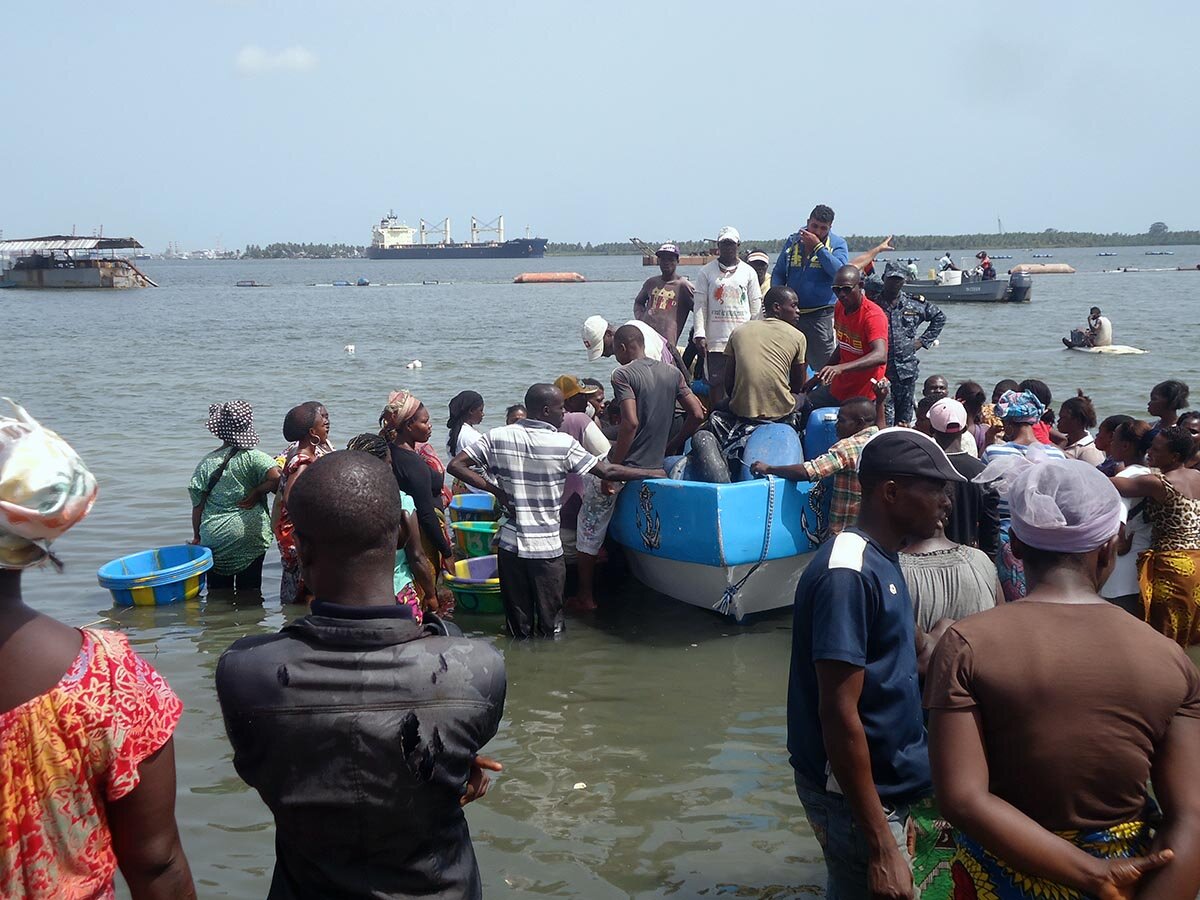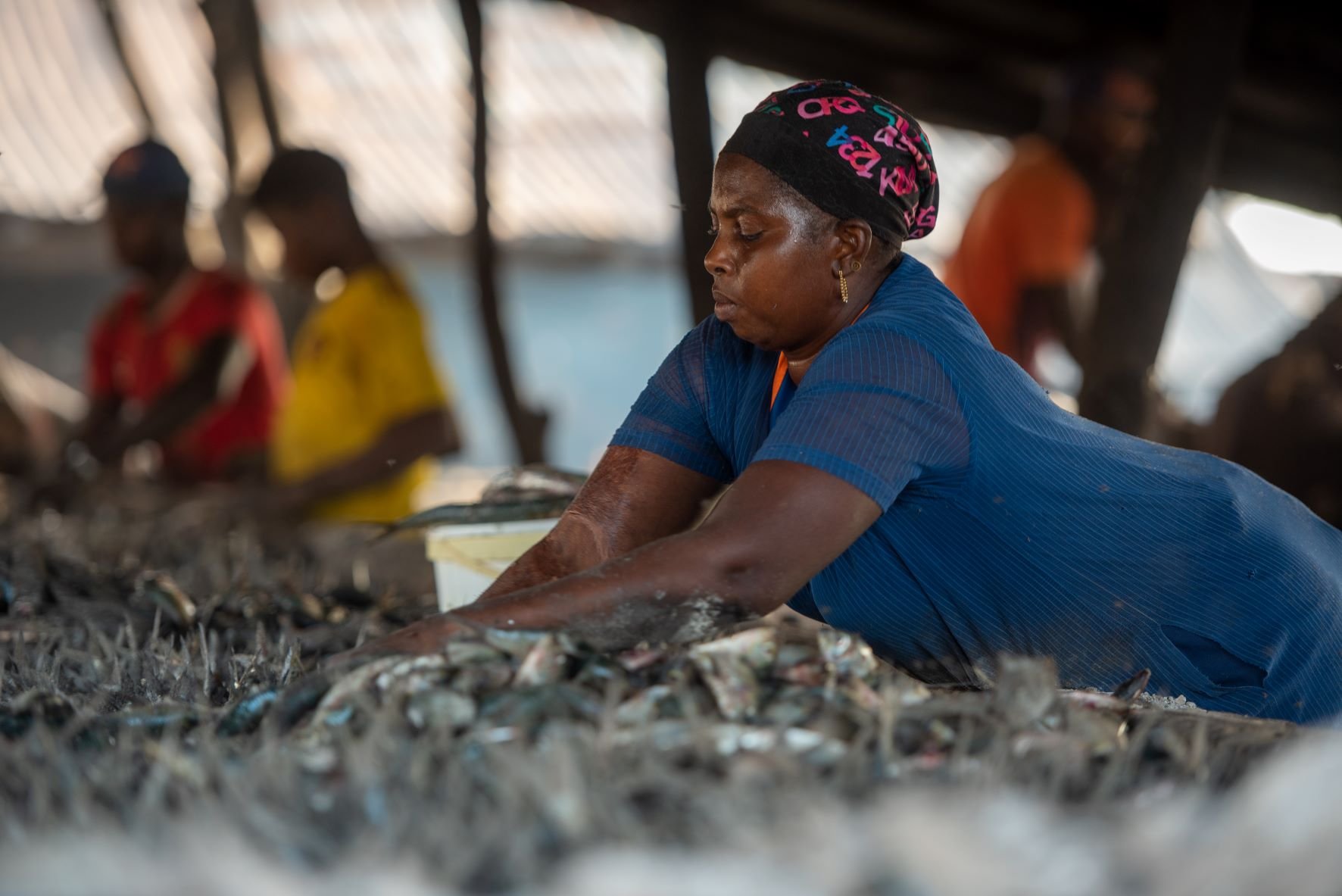In Côte d'Ivoire, more than half of the population is under 20 years old. In artisanal fishing communities such as Abidjan, San Pedro and Grand-Bereby, many young people are desperate for work.
With the scarcity of fish, becoming a fisherman or a woman fish processor is almost mission impossible. With a very low school attendance - on average, only a third of young people in fishing communities have had access to education, half that of young people nationally - finding a job outside the artisanal fishing sector is even more difficult.
In search of a better future for themselves and their families, these young men and women sometimes turn to illegal activities, such as drug trafficking or piracy. Others take the perilous route to Europe via the Mediterranean. In recent years, every year, more than 10,000 migrants of Ivorian origin have attempted to reach the shores of Europe via the Mediterranean. Côte d'Ivoire has thus become the third most important West African country for migration to Europe, after Nigeria and Guinea. These perilous journeys have caused many casualties, including among the young people who left the Ivorian fishing communities, which has caused great shock in these communities.
To give these young people a future in Côte d'Ivoire, the women of the Cooperative des Mareyeuses et Transformatrices des Produits Halieutiques d'Abidjan (CMATPHA) have reacted. They got together and decided to make room for them in the artisanal fish processing sector. “We are their mothers, we couldn't stand by and do nothing,” explains Micheline Dion Somplehi, president of the cooperative. In a show of solidarity, the women agreed to share the benefits of their activities with the young people, entrusting them with various tasks, such as unloading the catches and preparing the fish for processing.
Young people have become indispensable in the sector
When the pirogues arrive, young men armed with basins go to meet them to unload the catches and take them to the sites where the women process the fish or to the refrigerators where the fish will be stored. Being a 'chargeur’ (loader) is a full-time job during the high fishing season. It involves not only unloading the fish from the pirogues, but also putting the fish on ice, organising storage, cleaning the freezers. They are paid by the women processors they supply, 100 CFA francs per basin brought in. The fisherman whose catches they unload also offers them some fish for their consumption. At the end of the day, if they have unloaded several pirogues, they may have received enough fish to sell some, which enables them to improve their income.
‘Découpage’ – cutting the fish in pieces- is another activity that has been left to the young people. Many young men and women are involved in cleaning, gutting, scaling, heading and cutting up the fish so that it is ready for smoking. They are paid by the piece for this work, taking into account the size of the fish and its weight. They will also help the women fish processors to clean the equipment they use for smoking, drying or fermentation.
Other young people also act as guides for customers, explaining to them what fish species and products are available. Often they deliver the fish purchases to the customer, with wheelbarrows, tricycles or pushchairs. The customer pays them, sometimes 1000 CFA (1,5€) or even more. If they make about ten customers a day, this gives them a good income.
Today, more than 400 young women and men from the coastal communities of Abidjan, who were idle and without prospects - easy prey for drug traffickers or organisers of clandestine migration - have found something to live on thanks to the action of the women fish processors cooperative. Everyone benefits: it relieves the workload of the women fish processors, the young people get a revenue, and their activity also allows them to feel useful and better integrated into their community.
Support from the cooperative
“These young people come from the fishing community, and our ambition is to give them a foothold in the community. They know the fishing business because their mums and dads make a living from it. They are happy to stay in the community if they can earn a living,” says Micheline.
For several years, the Abidjan women fish processors cooperative has therefore helped them by buying equipment for them: wheelbarrows, boots, but also by helping them to organise into an association, and by integrating this association into the Union des Sociétés Coopératives des Femmes de la Pêche et Assimilées de Côte d'Ivoire (USCOFEPCI).
The women have organised numerous meetings with these young people, who used to spend their day hanging around the beach, to motivate them and help them organise their working day: for example, explaining to them that coming late for landings means penalising all the activities in the value chain. The women have also raised their awareness so that they can better manage their income. The young people of the association are also invited to training sessions organised for the cooperative by NGOs.
Since the beginning of this initiative to organise and give work to young people, the women of the Abidjan cooperative have had to rely only on themselves, receiving no external support: “We have sometimes had whole days of discussion with these young people, to organise their activity, to explain things to them, without being able to share a meal”, explains Micheline Dion: “We would like our experience to be known and shared, and for decision-makers, international organisations and NGOs to support our efforts, because the needs are greater and greater”.
Indeed, the Covid crisis, and the measures taken to combat the pandemic, have been a real ordeal for the whole country artisanal fishing communities. There has been an increase in precarity and misery, including for young people. Without the anchorage in the community that paid work offers them, they risk leaving for Europe illegally, or turn to illegal but lucrative activities.
This is why the women now want to extend the Abidjan cooperative's initiative to other artisanal fishing sites on the coast. A delegation of women processors has travelled several hundred kilometres to the fishing communities of Grand Bereby and San Pedro, where many young men and women are unemployed and desperate. Organising these young people, integrating them into the artisanal fisheries sector by training them for activities that help fishermen and women processors work, can make the difference between leaving or staying. “I appeal to all the women processors, all the mothers, all those who suffer from seeing their children leave or turn bad, to help create jobs for them in our sector. Our children, our young people, need to be encouraged, advised, supported morally and financially to create a future for themselves in artisanal fishing.”
Banner photo: Youth unloading fish on a beach in Ghana, by Samuel Aboh/Unsplash.












West Africa has pioneered several decades of artisanal fisheries management reform. Yet there are still major obstacles to co-management: a lack of political will reflected in low budgetary allocations; inadequate and poorly targeted support for fisher organizations; poorly defined roles and responsibilities of fishers in co-management; lack of enforcement of inshore exclusive zones; and inadequate defense of human rights and particularly the important role of women.